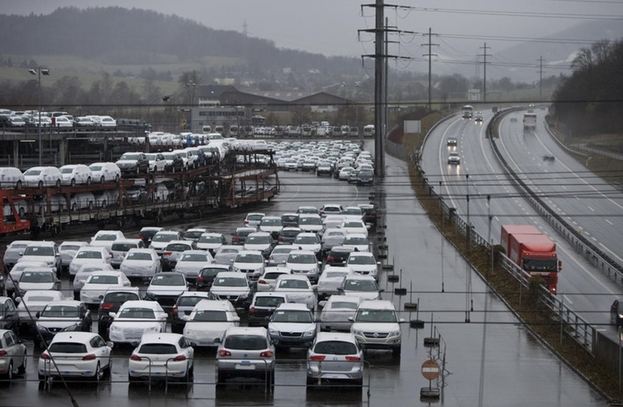Car sales are still rising in Switzerland. (Keystone) New cars imported into Switzerland have not been respecting the prescribed norms on CO2 emissions, with emission levels actually rising in 2017 and 2018, says a report published on Tuesday. Nearly half of importers failed to meet compulsory targets in 2018, according to the Federal Office of the Environment’s report for parliament. Total sanctions ordered against them came to CHF31.7 million (.3 million) in 2018 compared with CHF12.6 million in 2015. Regulations introduced in 2012 obliged importers into Switzerland to limit CO2 emissions to an average of 130g per km, as in the European Union. That norm was compulsory from 2015 to the end of 2019, and has now been reduced further to 95g of CO2 per km. But
Topics:
Swissinfo considers the following as important: 3.) Swiss Info, 3) Swiss Markets and News, Business, Featured, newsletter
This could be interesting, too:
Nachrichten Ticker - www.finanzen.ch writes Die Performance der Kryptowährungen in KW 9: Das hat sich bei Bitcoin, Ether & Co. getan
Nachrichten Ticker - www.finanzen.ch writes Wer verbirgt sich hinter der Ethereum-Technologie?
Martin Hartmann writes Eine Analyse nach den Lehren von Milton Friedman
Marc Chandler writes March 2025 Monthly

Car sales are still rising in Switzerland. (Keystone)
New cars imported into Switzerland have not been respecting the prescribed norms on CO2 emissions, with emission levels actually rising in 2017 and 2018, says a report published on Tuesday.
Nearly half of importers failed to meet compulsory targets in 2018, according to the Federal Office of the Environment’s report for parliament. Total sanctions ordered against them came to CHF31.7 million ($32.3 million) in 2018 compared with CHF12.6 million in 2015.
Regulations introduced in 2012 obliged importers into Switzerland to limit CO2 emissions to an average of 130g per km, as in the European Union. That norm was compulsory from 2015 to the end of 2019, and has now been reduced further to 95g of CO2 per km.
But between 2015 and 2019, the target was never met and even reached 137.8g per km in 2018, which was up 2.8% on the previous year.
The rise in emissions can be explained partly by an ever-increasing proportion of off-road vehicles and SUV models, plus an increase in the weight of vehicles, says the report. The decrease in the share of diesel-powered vehicles may also have contributed to these results.
Transport generates about one-third of CO2 emissions in Switzerland, and private cars are responsible for two-thirds of that share. In 2018, 301,000 new cars went on the road, according to the report. The proportion of four-wheel drive vehicles on Swiss roads has continued to rise, from 24.9% in 2006 to 49.1% in 2018.
Tags: Business,Featured,newsletter
